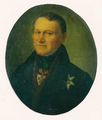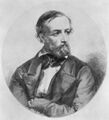July 27
1737: Natural scientist, explorer, and clergyman Erik Laxmann born. Laxmann will contribute to the taxonomy of Siberian fauna, and attempt to establish relations between Imperial Russia and Tokugawa Japan.
1801: Mathematician and astronomer George Biddell Airy born. His achievements will include work on planetary orbits, measuring the mean density of the Earth, and, in his role as Astronomer Royal, establishing Greenwich as the location of the prime meridian.
1837: Peter Dirichlet presented his first analytic number theory paper at a meeting of the Berlin Academy of Sciences. He proved the fundamental theorem that bears his name: Every arithmetical sequence an + b, n = 0, 1, 2, ... of integers, where a and b are relatively prime, contains infinitely many primes.
1844: Chemist, meteorologist, and physicist John Dalton dies. He proposed the modern atomic theory, and did research in color blindness.
1871: Logician and mathematician Ernst Friedrich Ferdinand Zermelo born. His work will have major implications for the foundations of mathematics; he will be known for his role in developing Zermelo–Fraenkel axiomatic set theory, and for his proof of the well-ordering theorem.
1928: Electrical engineer and physicist John Ambrose Fleming marries the popular young singer Olive May Franks of Bristol.
1938: Game designer Gary Gygax born.
1973: Math photographer Cantor Parabola takes advance photographs of the House of Representatives Judiciary Committee voting to recommend the first article of impeachment against President Nixon.
1974: Watergate scandal (nonfiction): The House of Representatives Judiciary Committee votes 27 to 11 to recommend the first article of impeachment (for obstruction of justice) against President Richard Nixon.








